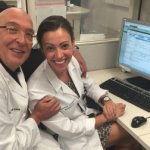For years now, I have read The Rheumatologist cover to cover (but only glance at the ads, but don’t tell the advertisers that). Len Calabrese’s piece, “The Science of Empathy in Rheumatology” in the January 2021 issue, hits the central point in medical care.
I would like to believe that it has been empathy that has driven most people to go through the rigors of medical training to be physicians. I “feel” empathy is a quality within all living creatures that is more evident or visibly/audibly expressed in humans. A person’s upbringing, both familial and societal, dictates the degree of empathy.
While I agree with Dr. Calabrese’s points, he needed to devote more time to the greatest obstacle to empathy, especially in community medical practice (I am not so sure it is the same in academia, which may be why he did not devote a greater portion to it), which is physician burnout. Namely, as Dr. Calabrese writes “our engagement in tasks peripheral to caring for patients …”
Until there is a meaningful conversation (not just lip service to this problem), and implemented solutions, “teaching” empathy is just more pontification from ivory towers.
Raheem Nazeer, MD, FACR
Unity Point Multispecialty Clinic
Dr. Len Calabrese Responds
Dr. Nazeer make a series of good points with which I wholeheartedly agree. Further, I share his frustrations and assure him the issues are equally acute in academia, where pressures are constantly increasing in the large healthcare environment.
I am sorry if my article was interpreted as an effort to “teach” empathy, because I was more intent on extolling its value to both patient and provider. Ultimately, achieving what our private practices and healthcare institutions want—namely, improving the patient experience, population health and controlling costs—will only be achieved when we improve the work life of clinicians.
I have no easy answers.


